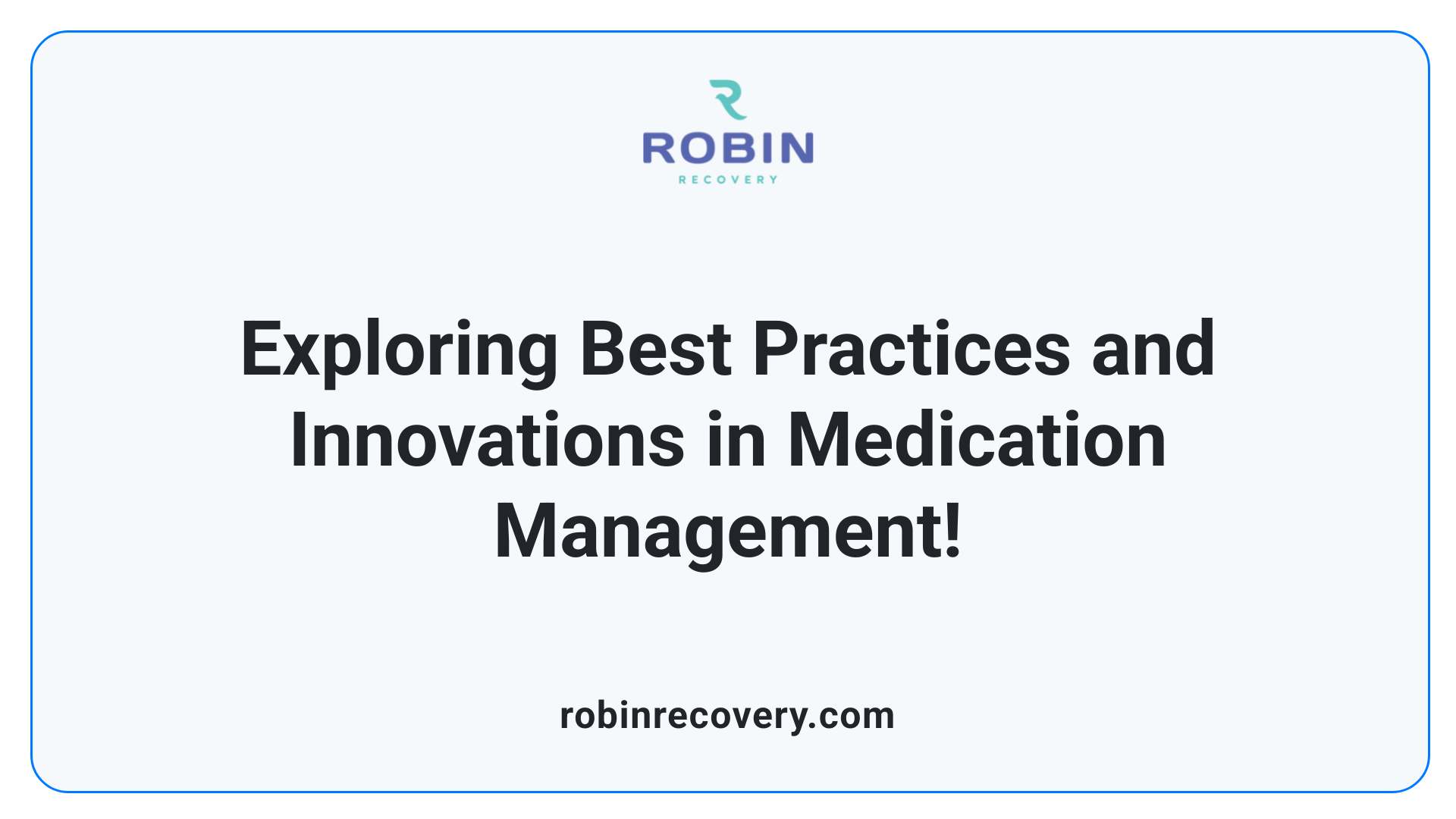The Role of Medication Management in Post-Treatment Success

Introduction
Medication management plays a pivotal role in ensuring successful outcomes post-treatment. By establishing structured protocols, healthcare providers can significantly improve patient recovery and reduce complications. This article explores the diverse elements of medication management, its importance, and strategies for optimizing its implementation to enhance post-treatment success.
The Core Responsibilities of Medication Management

What are the main responsibilities of medication management?
Medication management plays a crucial role in healthcare, encompassing a range of responsibilities designed to promote patient safety and improve treatment outcomes. The primary tasks involved include:
- Safe Storage and Dispensing: Ensuring that medications are stored correctly according to their specific requirements and dispensed safely to prevent misuse or errors.
- Proper Administration and Documentation: Administering medications at the correct dosages and maintaining thorough documentation to track medication use and patient responses.
- Adherence to Guidelines and Regulations: Following established guidelines from organizations such as the National Institute for Health and Care Excellence (NICE) and implementing safety protocols to minimize risks associated with medication errors.
Medication errors are a significant global concern, often occurring during administration, prescribing, or dispensing phases. Medication managers must adhere to the six R's of safe medication administration: Right patient, Right drug, Right dose, Right route, Right time, and Right documentation. Additionally, ensuring the competency and proper training of healthcare staff involved in medication management is essential, as mandated by regulatory bodies such as the Care Quality Commission (CQC).
Overall, effective medication management is vital for preventing harm and safeguarding the well-being of patients across health and social care settings, fostering an environment of trust and care.
Advancing Patient Care Through Medicines Management

What is the role of medicines management in patient care?
The role of medicines management in patient care is to optimize the benefits of treatments and achieve the best outcomes for patients, emphasizing patient-centered care. This comprehensive approach encompasses multiple stages of the medicines journey: manufacturing, procurement, prescribing, administration, and disposal. Each phase is crucial to ensure that medications are handled safely and effectively.
One of the primary goals is to improve the quality and cost-effectiveness of medication practices. This can include strategies such as increasing investment in practice-based pharmacists who play pivotal roles in managing prescribed therapies, thereby enhancing safety in prescribing and reducing potentially harmful medication errors.
Moreover, effective medicines management aims to ensure equitable access to medications for all populations. It involves continuous evaluation and adjustment of treatments based on patient responses, ensuring that each individual receives the right medication at the right time. Patient education, including understanding the purpose and side effects of medications, significantly influences adherence to treatment plans and, in turn, patient outcomes.
In summary, effective medicines management is crucial for delivering high-quality healthcare. By focusing on safety, accessibility, and optimal efficacy, healthcare providers can promote public health and significantly enhance recovery and overall patient satisfaction.
The Imperative of Robust Medication Management

Why is medication management considered important?
Medication management is a cornerstone of patient safety in healthcare. By meticulously managing medications, healthcare providers significantly reduce the risk of medication errors and harmful interactions. A comprehensive view of a patient’s medication needs is essential; utilizing tools like medication charts helps consolidate vital information, such as allergies and prescription due dates, ensuring that every provider is informed.
Enhancing accessibility
Innovations in medication management enhance accessibility for patients. For instance, initiatives such as the electronic National Residential Medication Chart (eNRMC) improve the prescribing process, especially in aged care, by reducing administrative burdens and the potential for errors. Furthermore, systems like Real Time Prescription Monitoring (RTPM) are pivotal in preventing the misuse of controlled substances, allowing healthcare professionals to balance access to necessary medications with robust safety measures.
Reducing errors
Ultimately, effective medication management not only improves health outcomes but also fosters a culture of safety and accountability among healthcare providers. By placing an emphasis on careful prescribing and ongoing patient education, healthcare systems can significantly mitigate the risks associated with polypharmacy and incorrect dosages, contributing to better long-term patient care.
Enhancing Communication Through Medication Therapy Management

How does medication therapy management enhance communication with healthcare providers?
Medication therapy management (MTM) significantly enhances communication within healthcare teams by promoting thorough discussions about a patient’s entire medication regimen. This includes not just prescribed medications but also over-the-counter drugs, vitamins, and dietary supplements. Well-structured consultations with trained pharmacists allow patients to gain deeper insights into their medications, understanding potential side effects and interactions.
By encouraging this dialogue, patients feel more empowered to discuss their treatment plans, fostering an environment of collaboration. The role of pharmacists is instrumental; they actively identify and resolve medication-related issues, providing recommendations to both patients and healthcare providers. This collaborative effort ensures necessary adjustments are made, optimizing therapeutic outcomes.
Additionally, pharmacists serve as mediators between patients and their healthcare teams. This collaboration effectively reduces medication errors, enhances adherence, and leads to improved health outcomes for patients. The overall impact of MTM is profound, creating a cohesive approach to medication management where everyone involved is well-informed and engaged, ultimately benefiting the patient's health journey.
Aspect Benefit Example Tools Consultations with pharmacists In-depth discussions on medication regimens Personalized medication reviews Patient education on medications Increases understanding and adherence Medication guides, informational pamphlets Collaborative healthcare planning Optimizes treatment outcomes Shared electronic health records
Addressing Medication Mismanagement and Its Impact
Consequences of Mismanagement
Medication mismanagement can lead to serious health complications, increased hospitalizations, and fatalities. Statistics indicate that up to 400,000 deaths annually in the U.S. are attributed to medical errors, many involving incorrect medication use. Furthermore, non-adherence to medication regimens contributes to escalated healthcare costs, with estimates of around $100 billion lost each year due to issues related to medication use and poor adherence.
For those undergoing surgical procedures, mismanaging post-operative medication can severely impair recovery and increase the risk of complications such as infections or blood clots. It is vital for patients to understand their medication purpose and schedule to avoid adverse events.
Strategies for Preventing Errors
- Patient Education:
- Providing clear information on medication purpose, side effects, and the importance of adherence can improve patient outcomes.
- Medication Reconciliation:
- Systematic reviewing of patient medications during transitions of care (discharge, transfers) is crucial to prevent errors and ensure continuity of treatment.
- Technology Utilization:
- Tools like electronic prescribing systems and medication reminder apps can streamline adherence and tracking.
- Regular Follow-ups:
- Consistent check-ins with healthcare providers allow for adjustments and addressing of patient concerns, leading to better management of medications and outcomes.
Best Practices and Innovations in Medication Management

Patient education and involvement
Effective medication management starts with patient education. Ensuring that patients understand not just the purpose of their medications but also potential side effects significantly enhances adherence to treatment plans. By addressing barriers like low health literacy and financial concerns, healthcare providers can empower patients to take an active role in their treatment. Involving patients in their medication plans fosters a sense of ownership, which can lead to better outcomes and satisfaction.
Technological aids
Technology plays a crucial role in optimizing medication management. Tools such as electronic health records (EHR) and medication reminder apps help streamline workflow and enable timely medication administration. These resources can alert patients about prescription refills, medication schedules, and even synchronize data with healthcare providers to ensure real-time updates on medication management. Such innovations help reduce the chances of medication errors and improve patient safety.
Interprofessional collaboration
Interprofessional collaboration is vital for successful medication management. A team approach, involving pharmacists, nurses, and physicians, enhances communication and continuity of care. Regular consultations among team members allow for a comprehensive understanding of each patient's medication needs. This shared responsibility ensures that drug therapy problems are identified and addressed promptly, ultimately improving overall patient outcomes.
Conclusion
Medication management is integral to post-treatment success, significantly reducing complications and optimizing patient outcomes. By prioritizing effective communication, patient education, and interprofessional collaboration, healthcare providers can enhance medication adherence and safety. Embracing innovative technologies further aids patients in managing their regimens, ultimately improving their quality of life. As healthcare continues to evolve, medication management remains a critical component in achieving comprehensive and successful patient care.
References
- Positive Patient Postoperative Outcomes with Pharmacotherapy
- Why Is Medication Management Important? - AdventHealth
- Improving Patient Care With Medication Management - Cureatr
- 4 Benefits of Medication Management
- Tools and tactics for postdischarge medication management ...
- What Is Medication Management? - Columbia Associates
- Medication Management - American Pharmacists Association
- The Importance of Medication Management for Mental Health Patients
- The Importance of Medication Management in Mental Health ... - NTX
